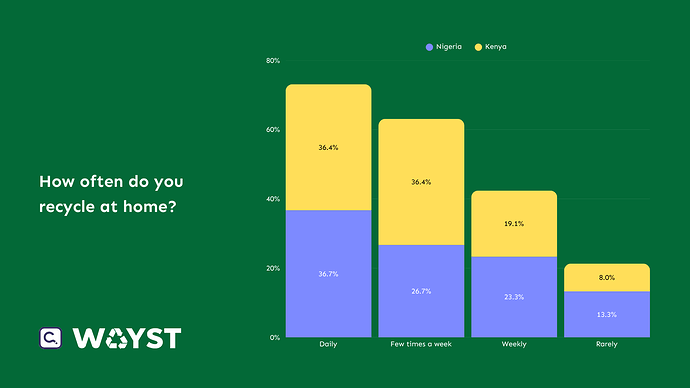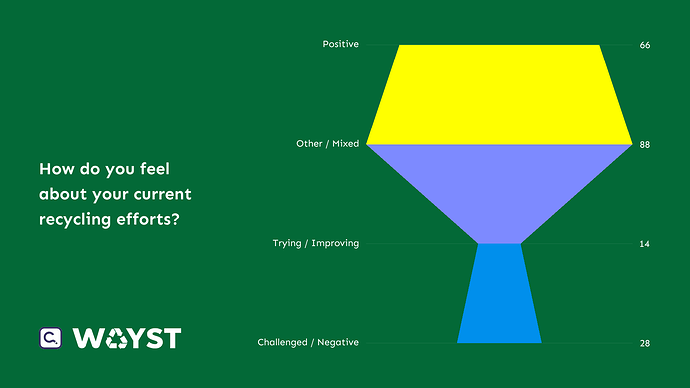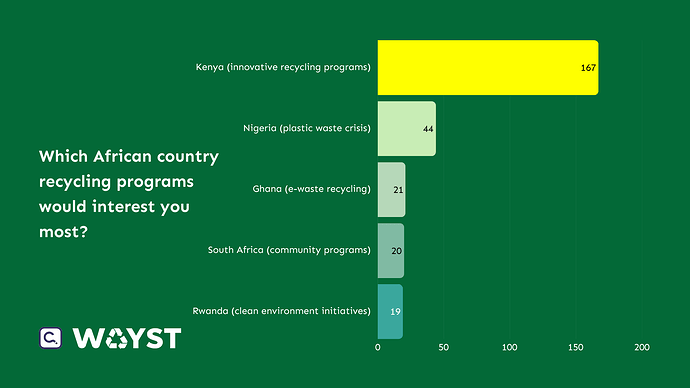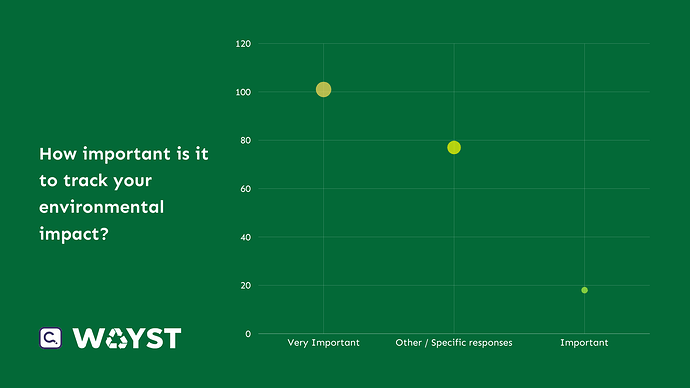Comprehensive survey analysis reveals recycling behaviours and digital reward preferences across East and West Africa.
Why This Research Matters
As climate change accelerates and plastic pollution threatens ecosystems across Africa, understanding how to motivate sustainable behaviours becomes increasingly critical. Digital reward systems represent a promising approach to environmental challenges, but their success depends on deep understanding of local contexts, cultural preferences, and technological readiness.
This research examines recycling habits and digital reward preferences across two influential African markets that, while sharing environmental challenges, demonstrate distinctly different approaches to technology adoption and environmental action. The findings provide crucial insights for designing effective, culturally relevant environmental programs that leverage digital innovation.
Understanding Our Sample
Survey demographics show strong representation from Kenya (82.7%) with significant Nigerian participation (15.3%).
Our analysis draws from 196 survey responses collected on Tuesday, July 29th, 2025, through the Pax Platform.
Earn tokens by completing micro tasks! Download our survey app to get notified about new earning opportunities and start making money instantly. Available on Google Play — scan the QR code or sign in with Google to get started.
Kenya dominates our sample at 82.7%, providing robust insights into East African perspectives, while Nigeria’s 15.3% representation offers valuable West African context. This geographic distribution reflects different stages of environmental program development and technology adoption across the continent.
The Demographics Tell a Story
Male respondents dominate the survey sample, representing over 4 out of 5 participants.
The demographic profile reveals important considerations for environmental program design. With 84.2% male participation, our findings highlight a significant gender gap in environmental technology engagement. This substantial imbalance suggests that successful programs must include targeted strategies to engage women, who often play crucial roles in household waste management decisions.
Youth-heavy demographics reveal 70.9% of respondents aged 18–25, indicating high digital solution receptivity.
The age distribution tells an equally compelling story: 70.9% of respondents are aged 18–25, with 92.8% under 35. This youth concentration suggests exceptional receptivity to digital solutions and technology-based environmental initiatives, but also indicates the need for broader demographic engagement to achieve community-wide environmental impact.
Current Recycling Landscape
Daily and frequent recycling habits show remarkable consistency between Kenyan and Nigerian participants.
Despite geographic and cultural differences, recycling patterns show striking similarities. Both countries demonstrate strong daily recycling rates (Kenya 36.4%, Nigeria 36.7%), with over 70% of respondents in both markets recycling at least several times per week. This high baseline engagement suggests fertile ground for enhancement through digital rewards.
Plastic bottles dominate recycling activities in both countries, with nearly 90% participation rates.
The material preference data reveals plastic recycling’s dominance, with nearly 90% participation in both countries. This aligns perfectly with Africa’s plastic pollution challenges and suggests that plastic-focused reward programs could achieve maximum impact and engagement. Paper recycling follows at around 40%, while electronics recycling remains limited, presenting opportunities for specialised programs.
The Sentiment Challenge
Mixed feelings about recycling efforts suggest significant opportunities for improved user experience and support systems.
While recycling participation rates are encouraging, sentiment analysis reveals challenges. Only 33.7% express positive feelings about their current recycling efforts, while 44.9% give mixed responses and 14.3% feel challenged or negative. This sentiment gap represents a crucial opportunity for digital reward systems to improve user experience and motivation.
Environmental Awareness and Priorities
Plastic pollution emerges as the top environmental concern, aligning with high plastic recycling participation rates.
Respondents demonstrate sophisticated environmental awareness. Plastic pollution leads concerns at 37.8%, followed closely by infrastructure gaps (31.1%) and collection issues (29.6%). This awareness-behaviour alignment between recognising plastic pollution and high plastic recycling rates suggests that targeted interventions could significantly amplify existing environmental consciousness.
Community Engagement Potential
Overwhelming enthusiasm for supporting African recycling programs, with 86.2% expressing strong interest.
Perhaps the most encouraging finding is the extraordinary enthusiasm for community engagement. An overwhelming 86.2% express strong interest in supporting African recycling programs, with 97.9% showing some level of positive interest. This community-minded approach suggests exceptional potential for social-driven and cross-border environmental initiatives.
Kenya’s innovative recycling programs attract highest interest at 85.2%, followed by Nigeria’s plastic waste initiatives.
The country-specific program preferences reveal Kenya’s innovative recycling initiatives attract 85.2% interest, while Nigeria’s plastic waste crisis programs garner 22.4% support. This pattern suggests that perceived innovation and effectiveness drive program appeal more than geographic proximity.
The Digital Rewards Revolution
Universal appeal of financial incentives with over 95% positive response across both countries.
The financial motivation data reveals perhaps the study’s most significant finding: 95%+ positive response to financial incentives across both countries. With 83.3% responding “Definitely yes” in both markets, digital reward systems clearly hold exceptional potential for scaling environmental action.
Cash preferences vary by region, with Nigeria favouring traditional money while Kenya shows strong cryptocurrency interest.
Reward type preferences reveal important cultural and technological differences. Nigeria shows stronger cash preference (66.7% vs 46.9%), while Kenya demonstrates notable cryptocurrency interest (39.5% vs 23.3%). These differences suggest that successful programs must offer flexible reward structures that accommodate varying technological comfort levels.
Immediate gratification dominates with 60% preferring rewards after each recycling action.
The timing preferences strongly favour immediate gratification, with 60.2% preferring rewards after each action. This finding has crucial implications for program design, suggesting that instant feedback and rewards are essential for sustained engagement.
Technology Integration and Verification
Photo-based verification emerges as the clear favorite, aligning perfectly with smartphone accessibility.
The verification preferences reveal practical technology adoption patterns. Photo-based proof dominates at 55.1%, followed by verified drop-off locations (18.4%) and QR code scanning (14.3%). This preference for accessible, smartphone-based verification methods aligns perfectly with Africa’s mobile-first technology landscape.
Trust and Program Design
Trust in recycling programs requires multifaceted approaches, with payment reliability emerging as key concern.
Trust factor analysis reveals that while responses are diverse (68.9% cite various factors), payment reliability emerges as the strongest specific concern at 20.9%. This finding emphasises that consistent, dependable reward systems are crucial for program credibility and sustained participation.
Strong environmental consciousness with over half considering impact tracking very important for program success.
Environmental impact tracking resonates strongly, with 51.5% considering it very important and an additional 9.2% rating it important. This suggests that successful programs should include robust measurement and reporting features that allow participants to see their environmental contributions.
The Motivation Behind Recommendations
Environmental benefits drive nearly half of all program recommendations, emphasizing altruistic motivations over personal gain.
Perhaps most tellingly, when asked why they would recommend recycling reward programs to others, 45.9% cite environmental benefits - far outweighing financial incentives at just 7.7%. This finding suggests that while financial rewards motivate personal participation, environmental impact drives program advocacy and viral growth.
What This Means for Environmental Tech
The findings reveal several fascinating patterns that could reshape how we think about environmental technology in Africa.
The Youth Opportunity: With over 70% of respondents under 25, there’s an incredible opportunity to build environmental habits early. But the stark gender gap (84% male participation) suggests we’re missing half the conversation. Women often make household decisions about waste - engaging them could dramatically amplify impact.
Plastic is the Gateway: Nearly 90% already recycle plastic, and it’s their top environmental concern. This isn’t about changing behaviour - it’s about enhancing what people already do. Plastic-focused programs can build on existing momentum rather than fighting uphill battles.
Speed Matters More Than We Think: The 60% preference for immediate rewards challenges the assumption that people will wait for environmental pay.
Looking Forward: The Digital Environmental Future
These findings suggest that Africa is uniquely positioned for digital environmental innovation. High smartphone adoption, strong environmental awareness, universal financial motivation, and exceptional community engagement create ideal conditions for scaled environmental action through digital rewards.
However, success will require nuanced approaches that respect cultural differences, address infrastructure challenges, and provide flexible solutions for diverse technological comfort levels. The key lies not in one-size-fits-all solutions, but in adaptive platforms that can accommodate varying preferences while maintaining consistent environmental impact.
Most importantly, the data suggests that environmental benefit - not just financial gain - drives program advocacy. This finding points toward sustainable growth models where initial financial incentives attract participants, but environmental impact creates advocates who drive organic program expansion.
The research reveals that digital rewards can bridge the gap between environmental consciousness and environmental action, creating scalable pathways for meaningful environmental impact across Africa’s diverse markets. As climate challenges intensify, such insights become crucial for designing effective, culturally resonant environmental programs that leverage technology for planetary benefit.
To incentivise participation and demonstrate practical blockchain application, respondents received 0.15 cUSD upon survey completion through smart contract distribution, verifiable at: 0xc2602309442c742eb8b991e72a83a52013f9fed4.
This research was conducted among real humans, thanks to the Pax integration with the GoodDollar Identity Verification (gooddollar.org). This report and its narratives were generated with AI assistance - based on the data given - and reviewed by the researcher - WAYST RECYCLING.
For more information about WAYST RECYCLING, visit waystrecyling.com.

















